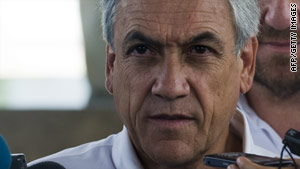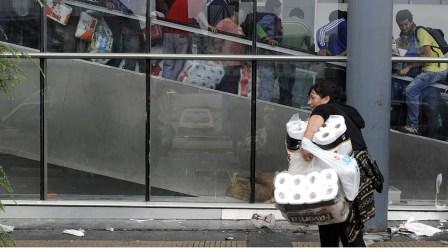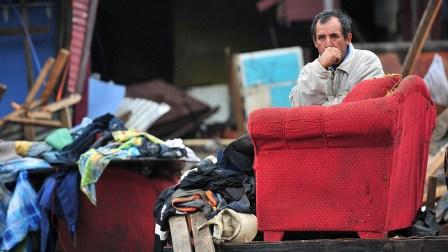Tempo de leitura: menos de 1 minuto
Security concerns [preocupações] spread [aumentam; se espalham (lit.)] as Chile quake [terremoto] death toll [número de mortos] rises [aumenta]
Santiago, Chile (CNN) — Heavily [densamente; pesadamente (lit.)] populated parts [regiões] of Chile still were without water service and electricity Sunday night because of Saturday’s 8.8-magnitude earthquake [terremoto], and reports of looting [saques] raised [eleveram] fears [receio, medo] about security in some [algumas] areas.
Cf. Como se diz “Escala Richter” em inglês?
The nation’s hardest-hit [mais atingida] major city [cidade grande, principal], Concepcion, declared an overnight [noturno] curfew [toque de recolher]. The death count [número de mortos] from the earthquake doubled on Sunday from a day earlier, to 708 deaths.
Calling Saturday morning’s quake an “unthinkable [impensável] disaster,” Chilean President Michelle Bachelet said a state of catastrophe [estado de emergência] in the hardest-hit regions would continue, allowing for the restoration of order [restabelecimento da ordem] and speedy [rápida] distribution of aid [ajuda, auxílio, assitência].
Looting broke out [eclodir] in parts of the country, including in Concepcion in central coastal Chile, about 70 miles (112 kilometers) from the earthquake’s epicenter [epicentro].
Desperate residents scrounged [vasculharam] for water and supplies [suprimentos] inside empty and damaged [danificados] supermarkets. On Sunday morning, authorities used tear gas [gás lacrimogêneo] and water cannons [mangueiras] to disperse looters [saqueadores] in some areas.
The quake struck [atingiu] before dawn Saturday, toppling [derrubando] thousands of houses and dealing a serious blow [causando um impacto considerável; dando um golpe forte (lit.)] to one of Latin America’s most stable economies. The Chilean Red Cross reported that about 500,000 homes had considerable damage [estragos, prejuízos] as a result of the quake.
Cf. Qual é a diferença entre “HOUSE” e “HOME”?

Chilean President-elect [presidente eleito] Sebastian Piñera, scheduled to [que deverá; programado para (lit.)] take office [tomar posse] in March, warned Sunday that looting could grow worse [piorar] with nightfall [anoitecer]. He called for [requereu, exigiu] more government help in restoring order.
“Tonight we will experience a very, very difficult situation with public order, particularly in the area of Concepcion,” Piñera told Radio Bio Bio.
Concepcion, the capital of the Bio Bio region, didn’t have enough police to control all those seeking [à procura de, em busca de] food and supplies from stores [lojas, estabelecimentos comerciais]. Some became desperate as supermarkets closed and gasoline was unavailable [faltou, estava indisponível (lit.)], CNN Chile reported.
On Sunday afternoon, people were seen entering a mill [moinho] looking for ingredients for bread. In the evening, a CNN team passed a dozen gas stations [postos de gasolina] that were being looted, with people siphoning [bombeando gasoline com mangueiras] gas. Military officers [policiais militares] were guarding a few [alguns poucos] gas stations, but few [poucos (insuficientes)] other signs of a government response could be seen.
Cf. Falsas Gêmeas: LITTLE x FEW
Looting was being done not just by desperate residents [moradores], but by others who were merely opportunistic, said Concepcion mayor [prefeito] Van Rysselberghe.
“They are robbing [roubando] everything,” she said, asking for a stronger military response to restore calm.
In addition to food, gas and emergency supplies, looters were targeting [tinham como alvo] appliance and electronics stores, Van Rysselberghe said.
Some small business owners [pequenos comerciantes] resorted [recorreram] to protecting their shops with rifles and shotguns [espingardas], said Rysselberghe, who also considered the current [existente, atual] police force inadequate [insuficiente].
Concepcion is under curfew from 9 p.m. Sunday to 6 a.m. Monday because of the looting. The city government is distributing water from the central plaza [praça].
Concepcion and its adjacent [vizinha, adjacente] sister city of Talcahuano, Chile, have a population of 840,000.
Video from Concepcion showed collapsed [desmoronadas] walls [paredes, muros] of buildings exposing twisted [retorcidos] rebar [vergalhões]. Whole sides [Laterais inteiras] of buildings were sheared off [arrancadas], and at least [pelo menos] two structures were on fire [em chamas].
Chile’s Office of Emergency Management launched [enviou; lançou (lit.)] a C130 helicopter Sunday with a contingent of 40 specialized firefighters [bombeiros] and 10 search dogs [cães adestrados (para missões de busca)] for the rescue effort [trabalho de resgate] in Concepcion.
People in their homes lacked [estavam sem] electricity. Hundreds faced [foram obrigados] sleeping in tents [barracas] on Sunday night.
Bachelet said her government reached an agreement [fez um acordo] with the country’s major [principais] supermarkets that would allow them to give away [doar] basic foodstuffs [alimentos, gêneros alimentícios] to those affected by the quake.
The armed forces [forças armadas] were available to help with security and the distribution of food, she said.
In Concepcion on Sunday, a long line [fila] of people waited for foodstuffs as military personnel [militares] stood watch [faziam a guarda, vigiavam]. “I have nothing,” one woman told CNN Chile. “I have no bread. I am a widow [viúva]. I am 81 years old.”
Of the 708 reported dead as of [até] Sunday afternoon, 541 had died in Chile’s Maule region, and 64 in the Bio Bio region, both in south-central Chile.
“I am certain that these are numbers that will continue to grow [aumentar],” Bachelet said.
Bachelet said Saturday that some [cerca de] 2 million people had been affected in one way or another, but she did not elaborate [não deu mais detalhes].
More than 90 aftershocks [abalos subsequentes] had been recorded [registrados], ranging [variando] from 4.9 to 6.9 in magnitude. A 6.2-magnitude aftershock was recorded near the earthquake’s epicenter on Sunday.
Chile has received many offers [ofertas] of international aid and will accept the help that it needs, Bachelet said. The U.S. military [forças armadas dos Estados Unidos] and the U.S. Agency for International Development were working to provide satellite phones, the State Department said Sunday.
“The Chilean government has not yet accepted additional offers of assistance, pending [dependendo, aguardando] the completion [conclusão] of an assessment [avaliação, análise] of specific needs,” State Department spokeswoman [porta-voz] Megan Mattson said, noting [observando] the airport in Santiago, Chile, was closed to foreign aid [ajuda estrangeira].
“As soon as [Assim que] the Chilean government establishes additional needs, the United States stands [estão, permanecem] ready [prontos] to assist [auxiliar, ajudar] in disaster response efforts,” she said.
U.S. Secretary of State Hillary Clinton will be traveling to Santiago on Tuesday on a previously scheduled trip [viagem previamente agendada] through Latin America. She had originally been scheduled to arrive [chegaria] Monday.
Bachelet said she hoped that the airport in Santiago, the capital, would reopen soon to private [privado], public and commercial air traffic [tráfego]. The country’s Department of Emergency Management said Sunday that repairs [consertos, reparos] at the airport would take [levariam, demorariam] 48 hours.
The airline LAN Chile said that three flights left from Peru to Chile on Sunday, one of them landing [pousando] in Santiago. These flights were not commercial, but were transporting Chileans stranded [em dificuldades] in Peru back to their country, LAN Chile spokesman Roberto Davila told CNN en Español.
Piñera sought to [procurou, tentou] rally spirits [animar, elevar o moral] in nationally televised remarks [observações, comentários, respostas] Sunday night, announcing a reconstruction plan called “Up With Chile.”
“We will raise [erguer] Chile,” he said. “It’s not going to be a short task [tarefa simples, curta (lit.)], it’s not going to be easy. It will require [exigir] a lot of effort, a lot of resources [recursos], and a lot of time.”
Saturday’s quake was 700 to 800 times stronger than the 7.0-magnitude quake that struck Haiti in January, which left about 212,000 people dead and more than 1 million homeless [desabrigados].
Chile’s quake also occurred at a greater depth [profunidade] — 21.7 miles — than the 8.1-mile depth of the Haiti quake, which contributed to much of the damage there.
Coastal Chile has a history [histórico] of deadly [devastadores; mortais (lit.)] earthquakes, with 13 temblors [tremores] of magnitude 7.0 or higher since 1973, the U.S. Geological Survey said. As a result, experts said that newer buildings are constructed to help withstand [suportar, aguentar] the shocks.
CNN’s Rolando Santos, Brian Byrnes, Karen Smith, Saeed Ahmed, Patricio Martinez and Patty Lane contributed to this report.



Nosssa, muito bom estes textos mastigados, estou olhando diariamento este site, como forma de aprimorar e aprender , estas leituras fazem parte do meu dia a dia. (a propósito, conheci este site através do jô soares).
Obrigado pela disponibilidade, só não aprende inglês quem não quer,a internet facilita muito com estas ferramentas.
André,
Obrigado pelo feedback. Fico contente em saber que você está aproveitando as dicas do Tecla SAP. Volte sempre e os resultados vão aparecer.
Abraços a todos
Quero reiterar as palavras do Warley, pois como tem me ajudado todo o conteúdo deste site. Obrigado por transmitir seus ensinamentos de um forma não egoísta. Desde que assisti sua entrevista no Jô Ulysses, não paro de acessar o conteúdo deste sitio.
jair
Jair,
Muito obrigado pelo depoimento simpático. Fico mesmo muito satisfeito ao receber feedback como o seu. Volte sempre!
Abraços a todos
Olá, gostaria de parabenizar à equipe do teclasap pelos excelentes conteúdos que têm sido postados. Estão de parabéns
É a primeira vez que eu comento, apesar de já acompanhar o teclasap há bastante tempo e gostar bastante de tudo que sempre leio aqui.
Apesar de ser a primeira vez, gostaria de dar uma sugestão: nos Textos Mastigados, algumas palavras são escritas em negrito e ao lado, entre colchetes, vem o significado. Na minha humilde opinião, isso acaba atrapalhando, pelo menos a mim, não sei se outros pensam da mesma forma. Atrapalha porque a cada duas palavras tem uma traduzida, isso acaba tirando a atenção do todo, do contexto, e nos prende apenas à palavra traduzida.
Seria melhor se tivesse as palavras destacadas e no final do texto viesse um vocabulário com a tradução das palavras e expressões.
Dou essa sugestão na tentativa de contribuir, pois gosto muito do blog e gostaria de vê-lo cada vez melhor.
É isso.
Warley,
Tudo bem? Obrigado pelo comentário e pela sugestão. É realmente complicado decidir, pois fica complicado também descer e subir no texto quando o glossário fica no fim do artigo. Já cheguei a fazer um mini-glossário ao fim de cada parágrafo para tentar encontrar um meio termo. Vamos ver se mais gente opina para que possamos escolher o formato que agrade a maioria.
Abraços a todos
Que coincidência… entrei neste Post para também fazer meu primeiro comentário neste blog, sugerindo a mesma coisa do Warley… Mas também o Ulisses tem razão quanto ao glossário ficar muito ao final da página… a minha sugestão é que seja pesquisada uma forma de colocar a tradução quando se passa o mouse em cima da palavra… se não for possível, acho melhor colocar em cada parágrafo…
Parabéns pelo blog, está sendo muito útil!
Gabriel,
Obrigado pela visita e pelo interesse no Tecla SAP. Infelizmente, não tenho conhecimento técnico suficiente para criar a solução que você sugere. Acabei me esquecendo de dizer na resposta ao Warley que um dos motivos de eu ter colocado as traduções no meio do texto é uma tentativa de evitar que o Google penalize o Tecla SAP por publicar conteúdo repetido na Internet. O robozinho de busca não sabe que a minha intenção não é a de “requentar” notícias. Na verdade, nem sei se adianta, mas foi a forma que encontrei para “quebrar” o texto da CNN.
Abraços a todos